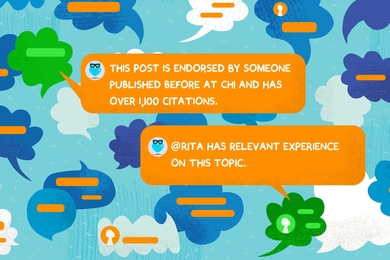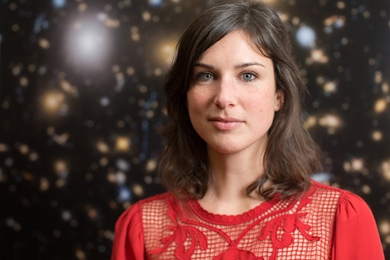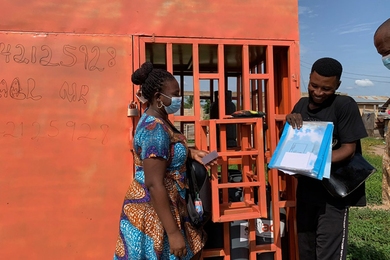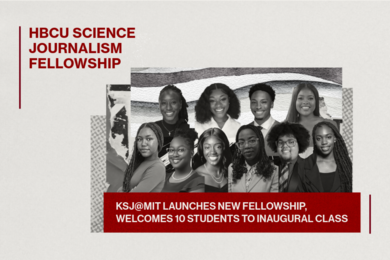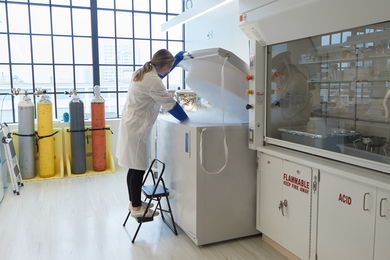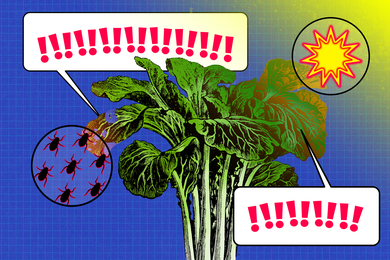HAPPY HEADLINES
Hats off to the writers who wrote the following headlines for newspaper stories about this year's Nobel Prize in physics, which was shared by Professor Wolfgang Ketterle of physics for creating a new form of ultracold matter.
"It's cool: Nobel awarded to US-based scientists" (Nyack, NY, Journal News-Rockland, Oct. 10).
"It's a matter of physics" (subtitled "MIT prof wins Nobel Prize for proving Einstein right"), Brookline Tab, Oct. 11.
"Cold atoms are hot, hot, hot" (subtitled "Physics Nobel goes to discoverers of Bose-Einstein condensates"), Chemical & Engineering News, Oct. 15.
"Physics Nobel recognizes smaller matters" (subtitled "Two Americans, German 'make atoms sing in unison'"), Toronto Star, Oct. 10.
BAG MATCHING: YES
A 1997 MIT study of matching baggage to passengers on domestic flights has been in the news again, given the renewed scrutiny of aviation security since Sept. 11. "We need to move as fast as possible to 100 percent bag matching," Professor Arnold Barnett of the Sloan School, who led the study, told The New York Times in a Nov. 3 story.
Similarly, he told USA Today for a Nov. 4 story that "until the goal is met of having all bags pass through explosive detection, the alternative of having unaccompanied suitcases entering airplanes is too dangerous."
From the two-week study of bag-matching on 8,000 domestic flights, wrote Richard A. Oppel Jr. of the Times, Barnett "estimated that imposing it on all flights would cost 25 to 52 cents a passenger and delay departures by an average of one minute."
POWER PLANT SAFETY
It would be difficult for terrorists to successfully attack a US nuclear power reactor, Professor Lawrence Lidsky of nuclear engineering told National Public Radio in a story on reactor vulnerability that aired Nov. 3.
Lidsky told reporter Scott Simon that "the danger in power plants is [that] once the reactor's been activated, the fuel needs to be cooled continually and for a long period of time, and the cooling of the fuel is the Achilles' heel of nuclear power plants and it's that [which] the terrorists would hope to interrupt."
He noted, however, that even if a terrorist could cause the fuel to melt, "that's only the beginning of a long chain of things that have to go wrong to release radioactivity to the public.
"I'm not trying to minimize the danger; I'm just really trying to say that it's not a very easy target for terrorists, and the psychological effect is likely to be ... much more than the effect of the real damage done to the public."
Simon later summarized Lidsky's comments: "Even, for example, if an agent of Al Qaeda or some other terrorist network ... was able to get a job in a nuclear power plant and insinuate themselves with the personnel there ... then one day gets up and decides that he or she is essentially going to interrupt the cooling of the fuel, the way you describe it, there is still a whole sequence of opportunities to intervene to prevent a disaster from happening." Lidsky agreed.
BIOINFORMATICS NEED
"There's a huge need for bioinformatics people. There are very few people who know exactly how to download the human genome right now. Even though it's publicly available, to do anything really fun with that requires some training and expertise. Those people with expertise in bioinformatics are really hard to find," said Dr. Atul J. Butte, a second-year student in the Harvard-MIT Division of Health Sciences and Technology's (HST) medical engineering and medical physics program. Dr. Butte, a fellow in bioinformatics at Children's Hospital, was quoted in an article titled "Training the Bioinformatics Boom" in the Oct. 15 edition of The Scientist.
Also contributing her perspective to the article was HST-affiliated faculty member Lucila Ohno-Machado, assistant professor of radiology and health science technology at Harvard Medical School.
"Even if you get access to the databases, how to use and what to use them for--knowing the research questions, knowing what can be answered is important. There's a lot of hype. People need to know about the quality of the databases and what queries you can make," she said. This spring, HST will offer a new predoctoral training program in bioinformatics and integrative genomics (see MIT Tech Talk, Oct. 3).
D.C. APPEARANCE
MIT was represented at the Department of Education's 15th annual National Meeting on Alcohol, Other Drug and Violence Prevention in Washington, D.C., on Nov. 10 by Christine Bates, Zina Queen and Eve Sullivan. Their participation was sponsored by Chancellor Philip Clay.
Bates, administrative officer for the Program in Science, Technology and Society, and Sullivan, editorial assistant in the Lab for Nuclear Science, are co-founders of Parents Forum. With Queen, an administrative assistant in the Spectroscopy Laboratory, they presented a poster about the Parents Forum and spoke at length with Dr. Daniel Trujillo, who in January will become MIT's dean for alcohol education and community development. The trio will repeat their presentation during the IAP Charm School on Feb. 1 in the mini-workshop "How to Tell Somebody Something They'd Rather Not Hear."
CLIPS AND QUOTES
"The comparison captures the sense of shock and vulnerability, but we still have not found the language to grasp the enormity and uniqueness of this particular attack."--Professor John Dower of history in an Oct. 11 San Jose Mercury News story. He was referring to Pearl Harbor Day, dubbed by President Roosevelt as "date which will live in infamy" and its new application to Sept. 11.
"Yes, our fears are real and justified, but dramatic play is a way to deal with feelings. Halloween provides an opportunity to play and should go on. No one should steal holidays from us."--Eve Sullivan, senior editorial assistant in the Laboratory for Nuclear Science and founder of Parents Forum, Inc., on CNN Headline News (Oct. 30), regarding parents' concerns for Halloween in light of Sept. 11 and subsequent events.
"It looks to me as if this settlement evens the playing field as much as you can when you're dealing with an 800-pound gorilla."--Professor Michael Cusumano of the Sloan School in a Nov. 3 New York Times story about the recent settlement of the antitrust suit brought against Microsoft by the federal government.
A version of this article appeared in MIT Tech Talk on December 5, 2001.
